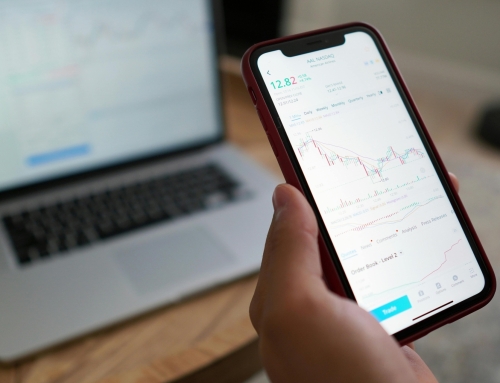Penny Stock guru, Peter Leeds, discusses what to watch for in 2014
 Peter Leeds began his penny stock experience as a 14 year old. Now, as an investment professional, he runs one of the most popular financial publications in North America. His publication, Peter Leeds Penny Stocks, has sold over 35,000 subscriptions.
Peter Leeds began his penny stock experience as a 14 year old. Now, as an investment professional, he runs one of the most popular financial publications in North America. His publication, Peter Leeds Penny Stocks, has sold over 35,000 subscriptions.
On Friday, December 6, I had the opportunity to speak with Peter about four trends coming in 2014. Below is our discussion:
Thomas: Could you begin by briefly introduce yourself?
Peter: I am the author of Penny Stocks for Dummies and Invest in Penny Stocks, and the editor of Peter Leeds Penny Stocks, which is one of the largest financial publications in North America. We've sold 35,000 subscriptions. Like you were saying, this is a much maligned end of the industry. Penny stocks have a bad name, and rightly so because most of them are garbage. But, there are good quality companies that are trading at low prices because they are overlooked or undiscovered. These are the companies that we try to call to our subscribers' attention.
T: Recently, you announced four investing trends to look for in 2014. Could you briefly describe those four trends?
P: There are records levels of cash that have not been put to work in terms of research and development, hiring and expanding market share. The tapering concern is also looming. Tapering is something that is going to happen in 2014, and it is something that is not as dramatically negative as people expect. Also, inflation will start in 2014. It's not on the radar right now, but heading into 2014, the beginnings of inflation will start up, and in 2015 we will see it get stronger and stronger. Lastly, we are seeing a return of the retail investor. The individual investor has actually been on the sidelines for a while. The government shutdown, the debt ceiling, the debates, all of these things have combined to get the retail investor to stay away from the markets. Now, individual investors are beginning to have the confidence to return.
T: Starting with your first point, how do you see companies using this cash. And, how will that effect the stock market?
P: $1 trillion is invested in banks by the larger companies like Caterpillar (CAT), Apple (AAPL) and Harley Davidson (HOG). I think now they are starting to realize that the economy is improving. Their projections are changing from fear and cash preservation to growth and opportunity. They are going to hire more. They are going to do some research and development. And, they are going to focus on mergers and acquisitions.
T: What effect will this have on penny stocks?
P: Penny stocks typically will be ripe for being acquired or taken over; even if the takeover is just to get employees or intellectual property. If it is a synergistic fit, you will see large and medium-sized companies scooping up these penny stock companies, especially in the mining space. There it is cheaper to acquire a company with known deposits of gold and metals than explore for it. There will also be a lot of acquisitions in the technology sector.
T: How will tapering affect small stocks?
P: People are worried that the taper is this looming, sky-is-falling, detrimental, negative thing, but it's common knowledge, it's baked into the pie. Tapering won't surprise anyone. So, people have already positioned themselves for the worst case scenario. What everyone is afraid of is not going to have much of a negative impact. It will almost be a non-issue.
T: So, tapering is already priced into the market?
P: I absolutely do.
T: What problems will inflation cause?
P: The purchasing power of the dollar will be worth less. It takes more dollars to buy the exact same thing. My father bought a house for $40,000 that is now worth $800,000. That's not necessarily saying the house is worth that much more, but it just takes more dollars to purchase the same property. You are going to see phantom inflation, where the box looks the same and costs the same but there is less inside it. There is a debate about raising minimum wage, which will add into inflation. Everything from tennis racquets to food to cars will cost more than they used to. Also, there will probably be an increase in salaries. So, people won't feel worse off, but it will take more dollars to do everything.
T: How do you see inflation specifically affecting small companies?
P: Things are going to cost more, from fuel to parts to labor. These companies are going to have to charge more, so they will pass the inflation on to the consumer. Some companies will come out on top or break even, while others will be in a very difficult situation.
T: Retail investors have been coming into the market more and more, as you mentioned. Why are they getting off the sidelines?
P: They were on the sidelines mainly because of uncertainty. There was the debt ceiling debate. There was the issue of who is going to run the Federal Reserve. The government shutdown was also a problem. And, the economy was basically in the dumps for a long, long time. A lot of people have been burned, and have memories of that. Over the past few years, there have been a lot of outflows from the stock market, but this year you are looking at about $165 billion going back into the stock market.
T: Do these retail investors invest in bigger stocks and mutual funds, or will some of that capital fall down to the penny stock/microcap arena?
P: Typically, they go first to the mutual funds. Then, they go to the blue-chips and large-cap stocks. Then, as they look for new opportunities for growth they move into the mid-caps and the small-caps. Eventually as they move down, some of that money is going to trickle all the way down to the penny stocks. When people are looking for the largest potential gain on their money, they look to penny stocks because that's where the biggest potential upsides are.
T: How will the market do in 2014?
P: The arrival of the retail investor is one of the last phases of a long bull run. Generally, once the retail investor gets back into it, it's a sign that we've reached the peak, and that there will be a little time where the market turns sideways and cools off a little bit. Retail investors usually get to the party a little bit late.
T: That's all I have. Do you have anything else that you would like to add?
P: These are my opinions, but the market will do so-so to pretty well in 2014. We are looking forward to continuing to help people find winning investments.





Leave A Comment